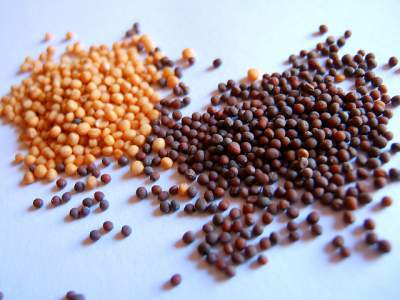
Food Standard Agency of UK reports that about 10 people die every year from anaphylaxis triggered by food allergy. Further it says that teenagers and adults are prone to severe symptoms.
In India and Bangladesh, mustard oil is considered edible and healthy. Enzymes present in this oil stimulate blood circulation; restrain fungal growth and easy digestion. In other parts of the world it is treated as irritant.
Anaphylaxis Campaign states that mustard allergy is rare in UK, but when the reaction occurs, it can be serious. It is one of the 14 major allergens that needed to be mentioned in pre-packed foods.
Immune system when comes in contact with the allergen, releases antibodies to identify harmful substances; these antibodies signal immune system to release chemicals to kill the threat. But unfortunately, antibodies fail to identify harmless proteins and releases chemicals. One of them is histamine. Histamine tries to thwart the foreign substance leading mustard oil allergy symptoms.
Symptoms of Mustard Allergy
Allergic reaction triggers as soon as you eat mustard or sometimes can take up to 2 hours. Symptoms may range from mild to severe. Mustard allergy is a serious problem in France and Spain, but no one knows about the number of people affected, says Anaphylaxis Campaign
Note: Allergy and intolerance aren’t identical. Just because you experienced unusual signs after consuming mustard this doesn’t mean you’re sensitive to it. When enzymes in digestive system fail to digest mustard, symptoms like gas, bloating and diarrhea may appear. This condition is known as food intolerance. Visit you doctor to confirm the difference between allergy and intolerance.
Mild symptoms of mustard allergy include:
- Nettle rash, hives or urticaria
- Itchy mouth
- Burning sensation in the mouth
- Wheezing, runny nose and nasal congestion
- Coughing
- Inflamed and redness on skin
- Itching and eczema
Severe symptoms of mustard allergy include:
- Swelling of face, throat and mouth
- Difficulty in breathing
- Asthma
- Abdominal pain
- Nausea and Vomiting
- Sudden drop in blood pressure (Anaphylactic shock)
- Unconsciousness
- Weak and floppy feeling
If anyone experiences these symptoms, then he/she need immediate medical attention. Allergist will diagnose you to confirm the cause of symptoms, you’ll be prescribed anti-histamines if you’ve mild allergy accordingly. Author, who conducted a study in Spanish with 29 patients with severe mustard allergy symptoms, say that patients with the allergy must be checked regularly.
Sources and types of Mustard
Mustard is present in many food items like
- Spices
- Sauces
- Baby food
- Salad dressing
- Salad oil
- Marinades
- Tomato sauce
- Ketchup
- Fish paste
- Mayonnaise
- Barbecue sauce
- Pickles
- Soups
- Processed meat
- Processed soup
before making purchase of the above items make sure you check the label of contents carefully. Apart from these foods always check the content list while buying packed and processed foods.
If you are out for having dinner , ask if your ordered dish contains mustard or not. Make the choice accordingly.
Mustard is available in variety of ways which are as follows
- Yellow mustard
- Oriental mustard
- Brown mustard
- Black mustard
Important Points
- Based on frequency of the allergy symptom, allergist may prescribe adrenaline injector which you must carry all the time.
- Avoiding mustard oil, seeds and powder is first line to defend the reaction. Other products that may include this ingredient are breads, curries, marinades, meat products, soups, sauces and salad dressings. (source)
- Check the ingredient list before having store brought food and make sure to ask restaurant authorities about the ingredients if you’re in a.
- Always be vigilant when food is around.
- Learn how to use adrenaline injector.

